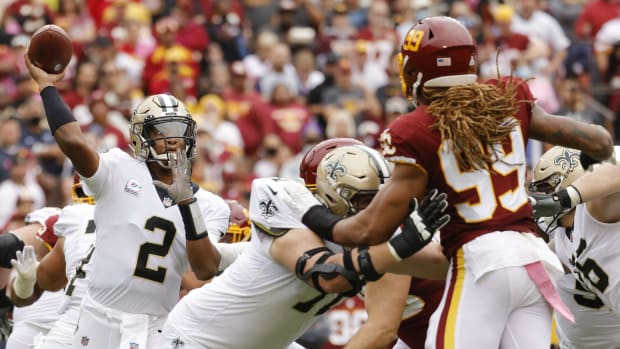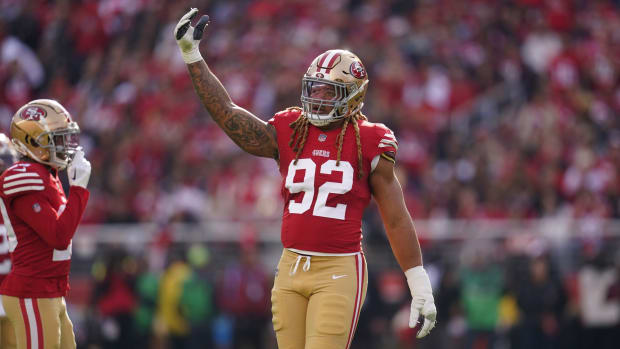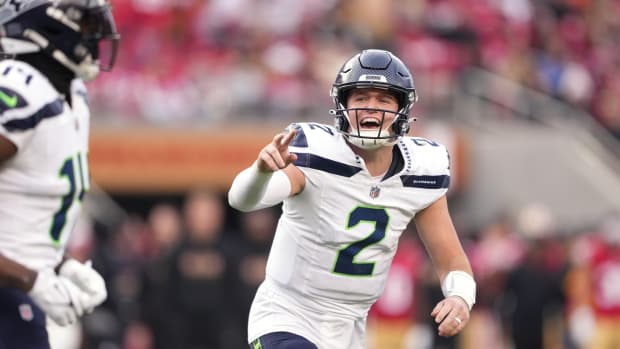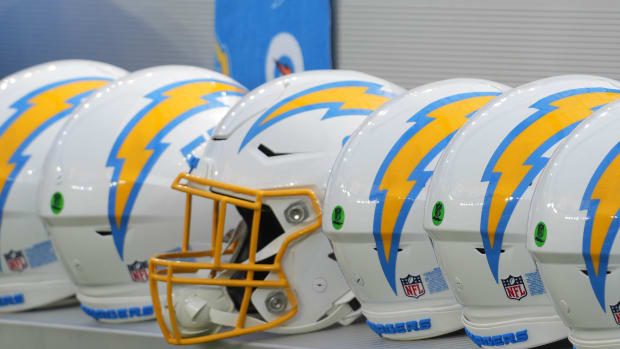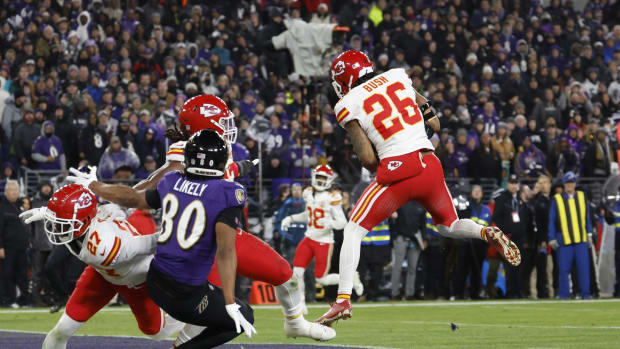
You Can't Please Everybody
D.J. Swearinger's hit on Dustin Keller, which ended Keller's season, helped give further life to the theory that protecting player's heads is just going to result in more injuries to the knees. (Scott Halleran/Getty Images)
There is no philosophical divide in the NFL quite like the one between offensive and defensive players when it comes to player safety and concussions. We spoke with five leaders from five teams in five different positions in an effort to take the pulse of the players. Here’s one thing they agree on: Pro football needs to change.
We asked each of them to analyze the new rules that affect them personally, whether it’s the ‘defenseless receiver’ rule which protects players in the process of making a catch from being hit in the neck or head, or the prohibitions on ballcarriers and tacklers lowering their heads into contact. We asked each player to illustrate his arguments by discussing a certain play in 2013. All were concerned about their brains, but several were more concerned about their knees.
Jay Cutler, Bears QB
'We signed up for this'
The play: In Week 6, on the Bears' first drive of the third quarter, Cutler scrambled to the right side for a gain of nine yards on 3rd-and-3. Making the tackle, Giants safety Will Hill made contact with Cutler's helmet, drawing an unnecessary roughness penalty.
Can football change? Will the sport become safer? How are concussions impacting the game’s future?
Introducing an in-depth series where we tackle those questions, starting at high schools and continuing into college and the NFL. Read the entire series.
“There’s a lot of stuff that’s getting called now that wouldn’t have been called when I first started playing, or when Lance (Briggs, Bears LB) started playing. It’s really hard to play defense. You’re talking about split-second decisions they’ve got to make on the move, two guys running in opposite directions and they’ve got to hit a target that’s about this big, and if they miss, they’re going to get fined and tacked with a penalty. Offensive numbers are going to go up. You like to see it as an offensive guy because it makes our lives easier. I wouldn’t want to play defense. I’ll say that. Is it good for the sport? There’s a big emphasis on protecting players, but at the same time we signed up for this stuff and it’s a contact game.”
D’Qwell Jackson, Browns LB
Hold officials responsible for bad calls
The play: In Week 1, Jackson knifed toward Ryan Tannehill on a third-down blitz and arrived as he threw the ball, colliding face to face with the Dolphins quarterback while making an apparent effort to spin away from the hit. A flag was thrown, but picked up after some discussion among officials.
“The league is forcing guys, defensive guys, to understand rules about what makes a vicious hit that are constantly changing. I’m the first one to stand up for player safety. If you can avoid a head injury, you should; those are serious. But I think we can do a better job of defining what constitutes a penalty. Nowadays if there’s a big hit you feel like there’s going to be a flag, especially if the guy doesn’t get right up. I find myself in the last two years being called for unsportsmanlike penalties—and that’s not how I want to be portrayed. I think the refs should be held more accountable. I know they get graded poorly for incorrect calls, but they should be fined the way we are. The risks have to be the same on both ends.
“With Ryan Tannehill this year, if you can avoid that big collision you do. And I can do that because I’m a smaller body, but they still almost called a penalty. If you put a big guy in that position, you’re going to get a bad outcome every time. He’s not able to shift his weight in the air and in that split-second you don’t have time to think. At that point, it’s left in the ref’s hands.”
Brian Hartline, Dolphins WR
I’d rather have a concussion than tear an ACL
The play: Hartline took issue with the preseason hit by Texans safety D.J. Swearinger on teammate Dustin Keller, which tore ligaments in the tight end’s knee and ended his season. Swearinger cited the defenseless receiver rule in his defense.
“With the defenseless receiver rule, now you have defenders making the conscious decision to go very low on a play when tackling. I would much rather have a bang-bang hit to my head than have someone dive at my knee. I’d be surprised if other players though otherwise. The improvements to the helmets have skyrocketed over the years, but the protection to the knees has not evolved at all. So I’d rather believe in all the millions of dollars of technology that’s been spent on protecting my head than have someone come at my bare, God-given knee.
“I don’t tackle for a living, so I can't criticize guys that do, but when people try to make excuses for things and throw the rule back in people’s faces to explain why they went so low? I don’t agree with that. The dude that hit Dustin is 5-10. Dustin is 6-2. It would be hard to go high on that guy. I just feel like there’s so much more area on a big guy to hit. And Dustin’s not even looking at you, so it’s not like you need to go that low to avoid getting run over. Honestly, I’m glad I’m not a ref these days because these calls are getting harder and harder to make. When you start throwing that player safety word around you can go anywhere. The realization is that this is a violent sport.”
Michael Griffin, Titans S
Making it safer for them makes it dangerous for us
The play: After Week 4 against the Jets, Griffin was fined $21,000 by the NFL for a hit that left receiver Stephen Hill with a concussion. The NFL cited the defenseless receiver rule in its explanation, but Hill had transitioned from receiver to blocker, as the ball was intercepted a split-second before he was struck.
“When I first came into the league, you rarely saw any flags for unnecessary roughness. Now there’s too much thinking. When you’re going in for a tackle, you’re thinking in the back of your mind how much you’re going to get fined or if you’ll be suspended. Now the flag is thrown on almost everything that looks like it could hurt somebody. I don’t think there’s a way to solve the concussion problem. You’re telling us to go low, and now you’re getting defensive players with head injuries. When you go low, you duck your head and you don’t see exactly what you’re hitting, because in order to go low, your head must take you low first. Now you’re getting kneed in the head. I had a teammate who got a concussion two weeks ago like that against Kansas City. I got hit in the head, and I was out for a series or so against San Diego.
“I still haven’t gotten back my ruling back on my appeal. I asked them, how long after the interception is he considered defenseless? And they said this is a new case because they’d never seen anything quite like it. But they asked me if I saw him catch the ball. And I said no, but I was making a block either way. I didn’t get flagged on the field because I was making the block.”
BenJarvus Green-Ellis, Bengals RB
Defensive restrictions are unfair, yet essential
The play: In Week 6, Packers wide receiver Randall Cobb fractured his fibula when Matt Elam dove at his legs in the process of making a tackle. Aaron Rodgers cried foul; Green-Ellis says the blame should go around.
“The league is always going to move in the direction of protecting players. Running backs can no longer lead with the crown of their head and I think that’s a good rule. Doing that puts you and the other player at risk. The defenseless receiver rule makes it very difficult on the defense. Nowadays you can run more middle routes, more slants because guys are not afraid to go in there anymore. Receivers are almost quarterbacks now. I think its essential for the future of the game. Those head injuries are more important than their side of the ball. When you add it all up in terms of entertainment, fans want to see points. It’s not fair to the defense but that’s the way it is.
“One consequence of the defenseless receiver rule is that players are coming in lower now. They’re already looking low from 10 yards away. Like the play that happened to Randall Cobb. The defender is a rookie, and he’s been taught since he got in this league to go low, and unfortunately Randall Cobb got hurt. That’s a new part of the game that’s going to hurt a lot of people. When a guy catches the ball you can aim for his shoulder pads, but when he lowers his head, you hit him in the head. There’s no simple solution.”



































